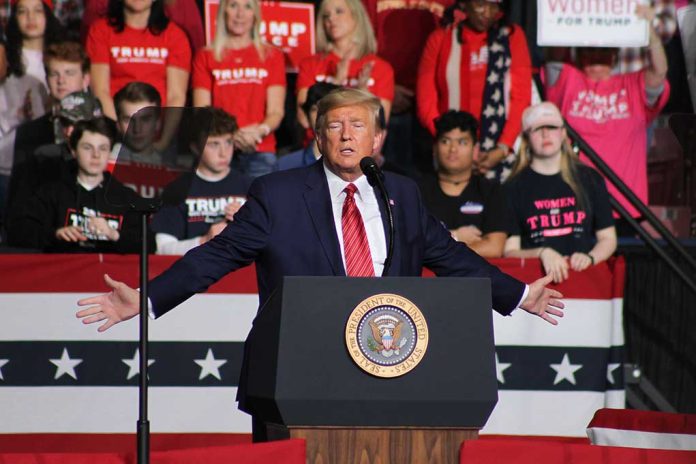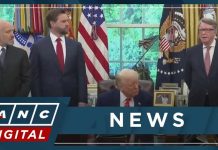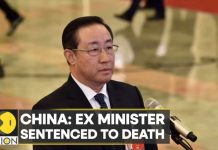
President Trump granted refugee status to white South African farmers fleeing systematic violence, confronting President Ramaphosa directly with evidence of targeted killings that the South African government continues to deny.
Key Takeaways
- President Trump has cut all U.S. assistance to South Africa and welcomed white South African farmers to the U.S. as refugees, citing evidence of targeted violence.
- During a White House meeting, Trump played videos showing anti-white rhetoric, including footage of opposition leader Julius Malema chanting “kill the farmer.”
- South African President Ramaphosa denied government involvement in farm murders, claiming there is no state policy targeting white farmers.
- Trump cited evidence that white Afrikaner farmers are fleeing to Australia and the United States to escape persecution.
- The controversy has sparked debate about land expropriation policies in South Africa and their impact on the white farming community.
Tense Oval Office Confrontation
In a dramatic Oval Office meeting, President Trump confronted South African President Cyril Ramaphosa with evidence of violence against white farmers in South Africa. The meeting, initially cordial, quickly turned tense when Trump insisted on showing videos documenting what he described as systematic persecution of white Afrikaners. Trump directed his staff to “Turn the lights down and just put this on,” before showing footage that included controversial South African opposition leader Julius Malema singing an anti-apartheid song with lyrics calling to “kill the farmer.”
Trump presented newspaper articles and evidence of what he called “death, death, death, horrible death” occurring in South Africa. The President has taken decisive action by cutting U.S. financial assistance to South Africa and implementing refugee policies to welcome persecuted white South African farmers to America. This move comes as increasing numbers of Afrikaners reportedly flee to countries like Australia and the United States seeking safety.
Refugee Crisis and Land Expropriation
President Trump’s decision to grant refugee status to white South African farmers highlights growing concerns about their safety amid controversial land expropriation policies. During the meeting, Trump directly accused Ramaphosa of confiscating land from white farmers, stating, “You’re taking people’s land away from them.” Ramaphosa immediately responded with a denial, saying simply, “We have not.” The exchange underscores the tensions surrounding South Africa’s approach to land reform, which critics argue has fueled violence against white farming communities.
The South African president attempted to downplay the confrontation, telling reporters, “You wanted to see drama and something really big happening. And I’m sorry that we disappointed you somewhat when it comes to that.” However, the meeting has shed light on the plight of white farmers in South Africa, with Trump claiming “We have thousands of stories talking about it” and asserting that Australia and the United States “are being inundated with people that want to get out” of South Africa Stated Cyril Ramaphosa
Disputed Claims and Denials
President Ramaphosa firmly rejected Trump’s characterization of the situation in South Africa. “We are completely opposed to that, that is not government policy and our government policy is completely, completely against what he was saying,” Ramaphosa insisted after the meeting. While South African officials claim U.S. criticism is based on misinformation, the reality on the ground appears more complex. South Africa remains one of the world’s most violent countries, with farm attacks affecting landowners of all races.
“You take a look at Australia, they’re being inundated and we’re being inundated with people that want to get out ” Said Donald Trump, President of the United States.
Despite Ramaphosa’s denials, Trump has remained resolute in his position. The South African government’s controversial land expropriation policies have raised legitimate concerns about property rights and the safety of minority communities. Trump’s executive order cutting funding to South Africa signals a clear shift in U.S. policy, prioritizing the protection of persecuted groups over diplomatic niceties. The President’s willingness to confront Ramaphosa directly on this issue demonstrates his commitment to addressing human rights concerns regardless of political pressure.
Ongoing Crisis and U.S. Response
The refugee status now granted to white South African farmers under the Trump administration represents a significant policy development. This decision acknowledges the real dangers faced by this community amid escalating farm attacks and controversial land policies. While Ramaphosa attempted to frame the visit as successful for trade and investment discussions, the President’s focus on human rights violations underscores America’s commitment to protecting vulnerable populations worldwide.
South Africa’s economy continues to struggle with inequality, but the Trump administration has made clear that addressing these issues cannot come at the expense of minority rights or through policies that encourage violence against specific ethnic groups. The confrontation between the two leaders has brought international attention to a crisis that has been overlooked by many global institutions and media outlets, potentially creating pressure for meaningful reforms to protect all South African citizens regardless of race.




